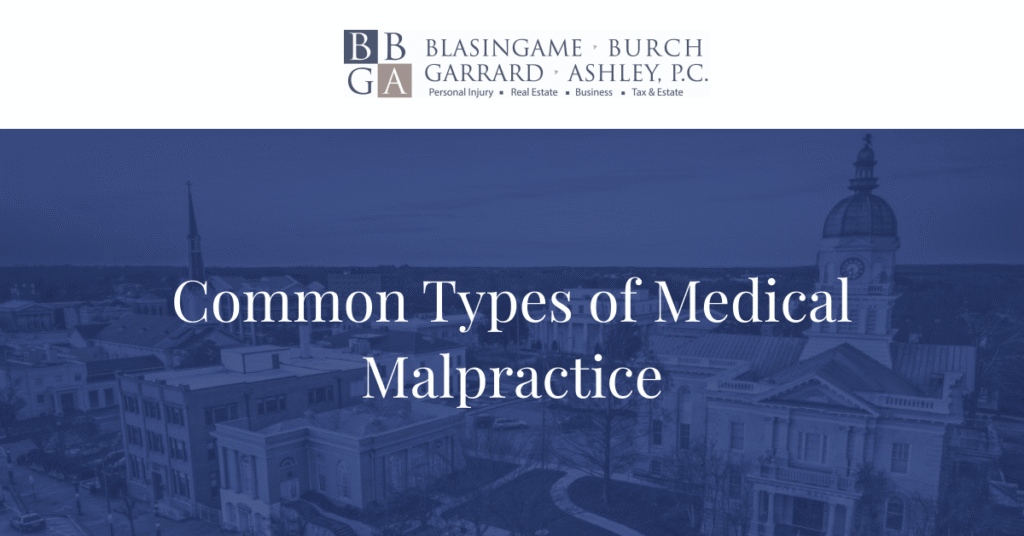
We rely on doctors to accurately diagnose and treat our illnesses. But what happens when things go wrong? What if their actions — or inaction — leaves you or a loved one in worse condition? Understanding the types of medical malpractice can help you recognize whether you have a valid claim.
If you’re in Georgia and believe a healthcare provider’s negligence has caused you harm, know that you’re not alone. Our experienced Georgia medical malpractice attorneys have helped many others in similar situations.
Below are the five most common medical malpractice claims we see in our law practice.
For a free consultation, please call (706) 354-4000 or send an online message today.
Key Points
- Medical malpractice occurs when a healthcare provider fails to meet the accepted standard of care, causing injury or harm to a patient.
- Common types of medical malpractice include misdiagnosis or delayed diagnosis, surgical errors, medication errors, birth injuries, and anesthesia mistakes.
- Victims of medical malpractice may be entitled to compensation if they can prove the provider’s negligence directly caused their injuries and resulting damages.
Contact Us
Misdiagnosis or Delayed Diagnosis
 Careless doctors can either completely fail to diagnose you with any medical condition or diagnose you with the wrong condition. As a result, you fail to get the proper treatment you need and, in many cases, receive unnecessary treatment that might end up injuring you even more, leading to further complications, prolonged recovery time, and additional medical expenses.
Careless doctors can either completely fail to diagnose you with any medical condition or diagnose you with the wrong condition. As a result, you fail to get the proper treatment you need and, in many cases, receive unnecessary treatment that might end up injuring you even more, leading to further complications, prolonged recovery time, and additional medical expenses.
It’s important to remember that not every misdiagnosis is medical malpractice. But if a doctor’s carelessness directly caused you significant harm, you might have a case. It’s worth considering whether you provided the doctor with all the necessary information, including your symptoms and medical history. If you didn’t, it could be more challenging to prove negligence on their part.
Additionally, you’ll need to demonstrate that another competent doctor wouldn’t have made the same mistake under similar circumstances. Essentially, you need to show that the doctor’s actions (or inactions) fell below the expected standard of care for a reasonably skilled physician. There are numerous medical malpractice case examples where delayed or incorrect diagnosis has led to severe consequences for patients.
Cancer, for instance, can progress from treatable to terminal if not diagnosed in a timely manner. In the case of a heart attack or stroke, every minute matters; a misdiagnosis can lead to lifelong disability or even death. And even seemingly minor infections, if left undiagnosed, can escalate into life-threatening sepsis.
Prescription Drug Errors
A medical professional can commit medical malpractice by prescribing the wrong prescription drug, administering the wrong dosage, or failing to check for potential allergies or harmful drug interactions. In Georgia, if a prescription drug error happens because of a healthcare professional’s negligence, it can be grounds for a medical malpractice claim. For example, a doctor might prescribe the wrong medication.
A pharmacist might overlook a dangerous drug interaction when filling a prescription. Or a nurse might administer the wrong dosage, resulting in patient injury. Sadly, these examples of medical negligence are common in nursing homes where residents might take up to a dozen prescription drugs at once.
Surgical Errors
Many things can go wrong in the operating room, and the toll can be serious when mistakes happen.
Here are types of medical malpractice that could occur during surgery:
- Wrong-site surgery: the surgeon operates on the wrong body part, leading to unnecessary procedures and potential complications.
- Wrong-patient surgery: the surgeon performs an operation on the wrong patient, a critical error with potentially catastrophic outcomes.
- Unintended injury: the surgeon causes harm to organs, nerves, or tissues during the operation, potentially resulting in long-term disability or impairment.
- Implements left behind: a surgeon might leave clamps, forceps, or sponges inside you after surgery has been completed, necessitating further procedures and increasing the risk of infection.
- Anesthesia errors: you might be given too much or too little anesthesia, or the anesthesiologist may not properly monitor you during surgery. For example, anesthesiologists are responsible for moving patients during surgery, so they do not stay in one place for too long.
- Infections: if staff does not scrub properly, they could carry a dangerous infection into the operating room. This can lead to additional pain, prolonged recovery, and potential sepsis or even death.
- Failure to monitor: a doctor might fail to check up on you to see how you are doing after surgery. As a result, you might have developed complications or infections that go untreated.
- Use of incorrect surgical instruments: if the surgeon uses the wrong tools during your procedure, it can cause unnecessary harm. This might mean larger incisions than needed, a higher chance of infection, or damage to nearby tissues, leading to more surgeries or a longer recovery time.
- Poor communication among medical staff: when the medical team doesn’t communicate properly before, during, or after surgery, it can result in serious mistakes. For example, staff might be too afraid to speak up to a surgeon, or teams that haven’t worked together before are rushed into a procedure, compromising your care.
After surgical errors, many victims need corrective surgery to fix the damage inflicted. This additional surgery not only takes its toll on your body but can keep you out of work even longer, adding to financial and emotional distress. Moreover, these errors can lead to long-term complications such as chronic pain, disability, reduced quality of life, and the need for ongoing medical care. The emotional impact can also be significant, causing anxiety, depression, and PTSD.
Get a Free Case Review
Simply submit the short form below to speak with an experienced Georgia medical malpractice attorney from BBGA about your case.
Childbirth Injuries
Labor and delivery can be traumatic for both mother and child. Both can suffer serious injuries when a doctor makes a medical mistake. Unfortunately, mistakes made during delivery can negatively affect your child long into the future.
Potential complications for mothers include:
- Excessive vaginal bleeding
- Preeclampsia
- Prolonged labor
- Complications from a Caesarean section
- Improper anesthesia administration
- Infection
Babies can also suffer a host of injuries during labor and delivery.
Many of the most common medical malpractice claims related to childbirth stem from birth injuries like:
- Shoulder dystocia
- Premature birth
- Hypoxic brain injury due to interruption of oxygen flow
- Broken bones
- Nerve damage
- Spinal cord injuries
- Cerebral palsy
- Cephalohematoma
Some of these injuries can lead to developmental delays and impaired cognition or speech for the rest of the child’s life.
Failure to Warn Patients of Risks
Doctors must give patients adequate information about the risks and possible complications of treatment, so the patient can give informed consent. It’s like signing a contract without reading it — you might agree to something you never intended. Similarly, when a doctor fails to explain a treatment’s possible complications or side effects, it’s like they’re asking you to sign a blank page. You need all the information to make the best choices about your health.
For example, if a patient is considering a major surgery like a heart bypass, they should be informed about the potential risks involved, such as infection, bleeding, stroke, or even death. When a doctor neglects this duty to inform and a patient is harmed as a result, it can constitute medical malpractice. This is because patients have a right to make autonomous decisions about their health, and this requires a full understanding of the potential risks of any treatment.
Speak with a Georgia Medical Malpractice Lawyer
If you or a loved one has suffered an injury at the hands of an incompetent or negligent medical professional, we want to hear from you. At Blasingame, Burch, Garrard, & Ashley, P.C., we’ve spent over 40 years fighting for those harmed by medical errors. We’ve stood up to hospitals and doctors, demanding accountability when they’ve failed their patients.
We know the law, but more importantly, we understand the profound impact these mistakes have on real lives. By taking action, you can help prevent future harm and hold negligent healthcare providers accountable.
If you’re ready to take the first step, contact us online or call (706) 354-4000 today for a free, no-obligation case evaluation.

